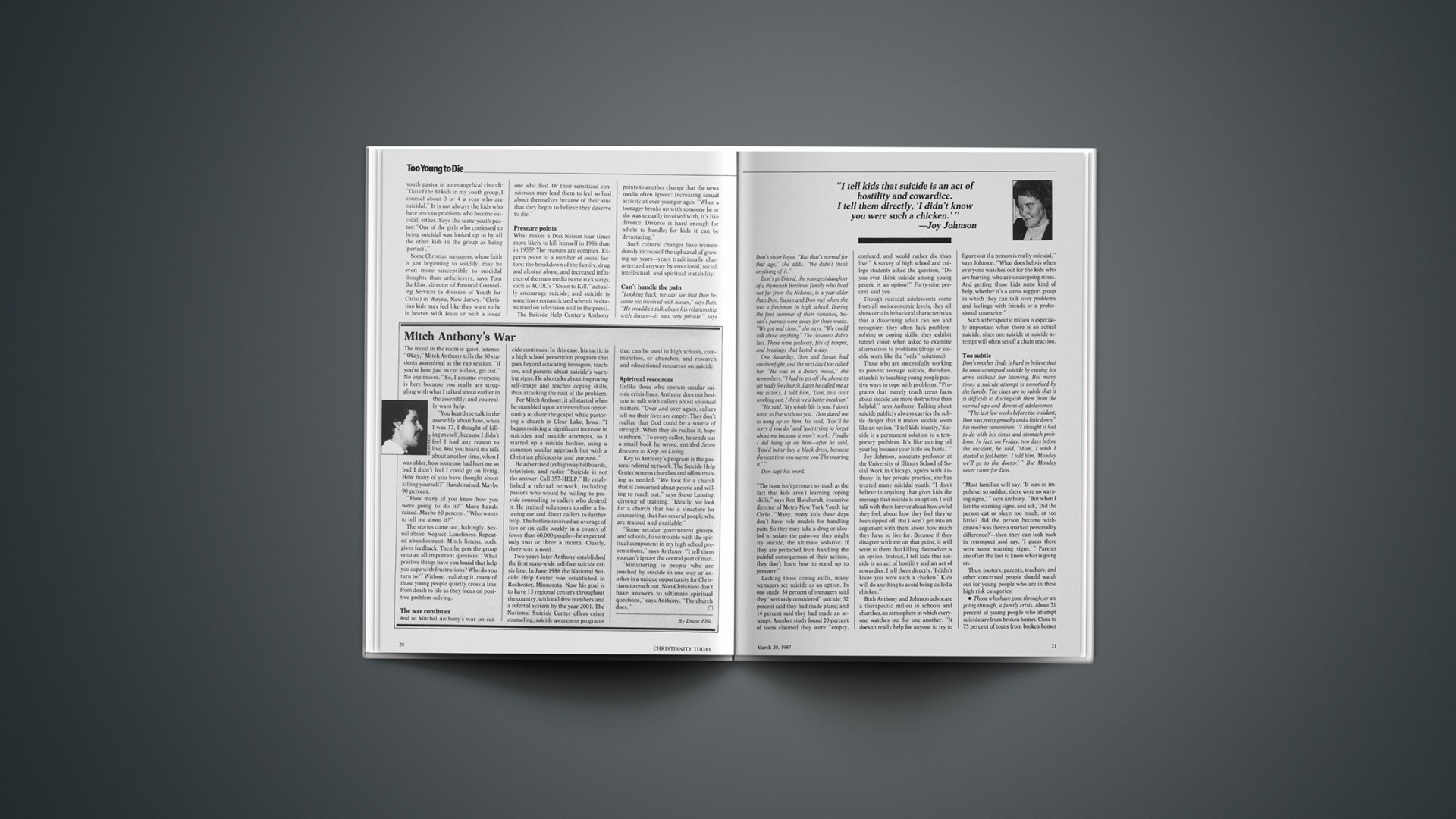The mood in the room is quiet, intense. “Okay,” Mitch Anthony tells the 30 students assembled at the rap session, “if you’re here just to cut a class, get out.” No one moves. “So, I assume everyone is here because you really are struggling with what I talked about earlier in the assembly, and you really want help.
“You heard me talk in the assembly about how, when I was 17, I thought of killing myself, because I didn’t feel I had any reason to live. And you heard me talk about another time, when I was older, how someone had hurt me so bad I didn’t feel I could go on living. How many of you have thought about killing yourself?” Hands raised. Maybe 90 percent.
“How many of you knew how you were going to do it?” More hands raised. Maybe 60 percent. “Who wants to tell me about it?”
The stories come out, haltingly. Sexual abuse. Neglect. Loneliness. Repeated abandonment. Mitch listens, nods, gives feedback. Then he gets the group onto an all-important question: “What positive things have you found that help you cope with frustrations? Who do you turn to?” Without realizing it, many of those young people quietly cross a line from death to life as they focus on positive problem-solving.
The War Continues
And so Mitchel Anthony’s war on suicide continues. In this case, his tactic is a high school prevention program that goes beyond educating teenagers, teachers, and parents about suicide’s warning signs. He also talks about improving self-image and teaches coping skills, thus attacking the root of the problem.
For Mitch Anthony, it all started when he stumbled upon a tremendous opportunity to share the gospel while pasturing a church in Clear Lake, Iowa. “I began noticing a significant increase in suicides and suicide attempts, so I started up a suicide hotline, using a common secular approach but with a Christian philosophy and purpose.”
He advertised on highway billboards, television, and radio: “Suicide is not the answer. Call 357-HELP.” He established a referral network, including pastors who would be willing to provide counseling to callers who desired it. He trained volunteers to offer a listening ear and direct callers to further help. The hotline received an average of five or six calls weekly in a county of fewer than 60,000 people—he expected only two or three a month. Clearly, there was a need.
Two years later Anthony established the first state-wide toll-free suicide crisis line. In June 1986 the National Suicide Help Center was established in Rochester, Minnesota. Now his goal is to have 13 regional centers throughout the country, with toll-free numbers and a referral system by the year 2001. The National Suicide Center offers crisis counseling, suicide awareness programs that can be used in high schools, communities, or churches, and research and educational resources on suicide.
Spiritual Resources
Unlike those who operate secular suicide crisis lines, Anthony does not hesitate to talk with callers about spiritual matters. “Over and over again, callers tell me their lives are empty. They don’t realize that God could be a source of strength. When they do realize it, hope is reborn.” To every caller, he sends out a small book he wrote, entitled Seven Reasons to Keep on Living.
Key to Anthony’s program is the pastoral referral network. The Suicide Help Center screens churches and offers training as needed. “We look for a church that is concerned about people and willing to reach out,” says Steve Lansing, director of training. “Ideally, we look for a church that has a structure for counseling, that has several people who are trained and available.”
“Some secular government groups, and schools, have trouble with the spiritual component in my high school presentations,” says Anthony. “I tell them you can’t ignore the central part of man.
“Ministering to people who are touched by suicide in one way or another is a unique opportunity for Christians to reach out. Non-Christians don’t have answers to ultimate spiritual questions,” says Anthony. “The church does.”










